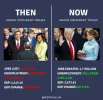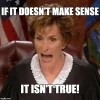Phoenix68
Well-Known Member
- Joined
- Mar 12, 2022
- Messages
- 12,329
.
(...'Cause, that's kinda what Republicans do!!)
.
.
Why America Abandoned The GREATEST ECONOMY In HISTORY
November 25, 2023
.
"If there is one statistic that best captures the transformation of the American economy over the past half century, it may be this: Of Americans born in 1940, 92 percent went on to earn more than their parents; among those born in 1980, just 50 percent did. Over the course of a few decades, the chances of achieving the American dream went from a near-guarantee to a coin flip.(...'Cause, that's kinda what Republicans do!!)
.
.
Why America Abandoned The GREATEST ECONOMY In HISTORY
November 25, 2023
.
What happened?
One answer is that American voters abandoned the system that worked for their grandparents. From the 1940s through the ’70s, sometimes called the New Deal era, U.S. law and policy were engineered to ensure strong unions, high taxes on the rich, huge public investments, and an expanding social safety net. Inequality shrank as the economy boomed. But by the end of that period, the economy was faltering, and voters turned against the postwar consensus. Ronald Reagan took office promising to restore growth by paring back government, slashing taxes on the rich and corporations, and gutting business regulations and antitrust enforcement. The idea, famously, was that a rising tide would lift all boats. Instead, inequality soared while living standards stagnated and life expectancy fell behind that of peer countries. No other advanced economy pivoted quite as sharply to free-market economics as the United States, and none experienced as sharp a reversal in income, mobility, and public-health trends as America did. Today, a child born in Norway or the United Kingdom has a far better chance of outearning their parents than one born in the U.S."
.

![kids+laughing[1].webp kids+laughing[1].webp](https://www.houseofpolitics.com/data/attachments/10/10013-669611be60c6f349cdc7e748d8b6d70a.jpg?hash=6hiAf38Fiy)


